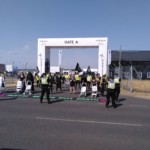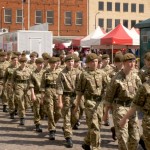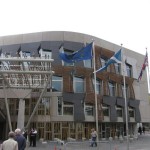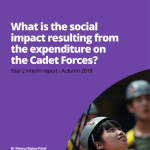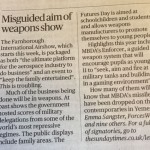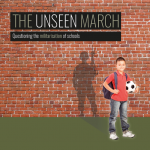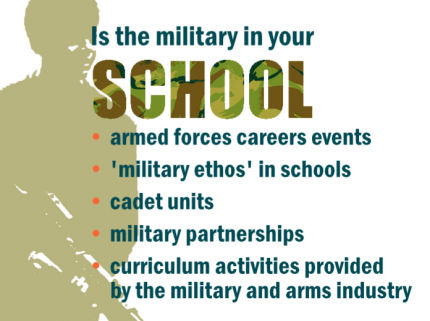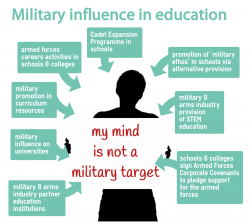 The UK armed forces visit thousands of schools each year. They offer career presentations, curriculum resources and other activities aimed at promoting the interests of the military and long-term recruitment. Since 2012, the Department for Education have promoted ‘military ethos’ programmes such as cadet units in state schools and ‘alternative provision with a military ethos’.
The UK armed forces visit thousands of schools each year. They offer career presentations, curriculum resources and other activities aimed at promoting the interests of the military and long-term recruitment. Since 2012, the Department for Education have promoted ‘military ethos’ programmes such as cadet units in state schools and ‘alternative provision with a military ethos’.
The armed forces and arms companies are increasingly involved in the provision of STEM (science, technology, engineering and maths) activities for school and college students. and they also sponsor a number of careers-led secondary schools. The armed forces also now sponsor youth organisations like Girlguiding and Scouts. See more here.
Should the armed forces by given access to children within education? How can we challenge their activities in schools and colleges? How can a more balanced view of the military be given to young people?
While there are claims that school involvement is not about recruiting young people, the Ministry of Defence has itself stated that visits to educational establishments are a ‘powerful tool for facilitating recruitment’.
In having contact with young people, the military aim to sow seeds in impressionable young minds. In 2007, the head of the Army’s recruitment strategy said, “Our new model is about raising awareness, and that takes a ten-year span. It starts with a seven-year-old boy seeing a parachutist at an air show and thinking, ‘That looks great.’ From then the army is trying to build interest by drip, drip, drip.”
The influence of military interests in education and youth activities raises concerns around:
- recruiting-related activities in school
- child welfare issues
- the unrepresentative portrayal of the armed forces
- weapons in schools and at public events aimed at interesting children and teenagers in a military career
- the need for balance in teaching controversial issues
- the lack of balance with other career providers coming into schools
- the lack of parental consultation and policy scrutiny
- concerns around targeting disadvantaged areas and prioritising over other youth activities
- lack of balance with education for peace
- marginalising individuals and groups to do not wish to participate in military-related activities
See our briefing on Military involvement in education and youth activities in the UK.
We recognise the importance of debate and critical thinking in helping young people make an informed choice about the military and its activities. This is particularly important for those thinking of a career in the forces, a uniquely risk-laden occupation. If the military are allowed to have a presence and influence in the UK education system then it should be balanced by a thorough exploration of opposing views and approaches, as demanded by the 1996 Education Act.
Useful resources
More military days in schools
Military activity in UK schools
Conscience and Conviction – WWI school resources
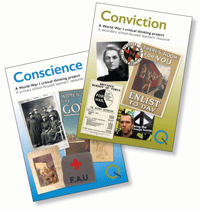 Quaker Peace and Social Witness has produced two new resources for peace education: Conscience (primary school-focused) and Conviction (secondary school-focused).
Conviction can supplement existing lesson materials in subjects such as History, Religious Education or Citizenship, and be used to support the delivery of Personal Social Health Education (PSHE) or Spiritual Moral Social Cultural (SMSC) education.
Through engaging with speaking and listening activities in pairs and groups, children can discuss and reflect on historical source materials including documents, letters, posters and images.
Quaker Peace and Social Witness has produced two new resources for peace education: Conscience (primary school-focused) and Conviction (secondary school-focused).
Conviction can supplement existing lesson materials in subjects such as History, Religious Education or Citizenship, and be used to support the delivery of Personal Social Health Education (PSHE) or Spiritual Moral Social Cultural (SMSC) education.
Through engaging with speaking and listening activities in pairs and groups, children can discuss and reflect on historical source materials including documents, letters, posters and images.
Engage: the Military and Young People
A short film made by Headliners and ForcesWatch, 2014
Why does the military have a 'youth engagement' policy and why is the government promoting 'military ethos' within education? What is the impact of military activities taking place in schools? ForcesWatch have been working with the charity Headliners and a group of young people in London to produce this short film which explores these questions and gives teenagers the opportunity to voice their reaction to the military’s interest in their lives.Launch of new film on the military and young people
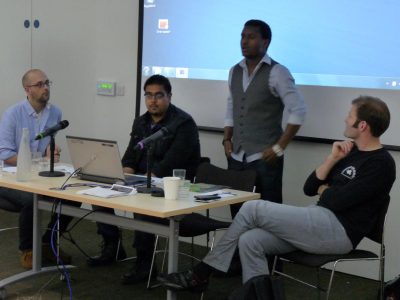 On Thursday 26 June 2014, we launched our new short documentary film 'Engage: the military and young people', at Friends House in London. A packed and diverse audience watched the film, which was very well-received. Speakers included Ben Griffin, founder of Veterans for Peace UK, Sam Hepworth from Headliners (the youth journalists charity who made the film) and some of the young filmmakers, and Owen Everett, Education Campaign worker at ForcesWatch.
On Thursday 26 June 2014, we launched our new short documentary film 'Engage: the military and young people', at Friends House in London. A packed and diverse audience watched the film, which was very well-received. Speakers included Ben Griffin, founder of Veterans for Peace UK, Sam Hepworth from Headliners (the youth journalists charity who made the film) and some of the young filmmakers, and Owen Everett, Education Campaign worker at ForcesWatch.
Peace Education Network
 The Peace Education Network is a national UK network that brings together people and organisations committed to education for peace.
The Peace Education Network is a national UK network that brings together people and organisations committed to education for peace.
Teach Peace pack
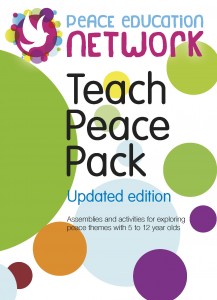 Teach Peace, a new resource from the Peace Education Network, is a set of eight assemblies, follow-up activities, resources, prayers and reflections on peace for primary schools.
From the UN peace day, 21 September, to the International Day for Children as Victims of War, 4 June, the school year is ?lled with opportunities to use the assemblies and activities in Teach Peace. This resource will help to ensure peace is a key theme in our children’s education and help you to celebrate peace and the peacemakers in your school.
The entire resource is free to download below. Hard copies of Teach Peace are available from the Peace Education Network for £5. Also available in Welsh.
Teach Peace, a new resource from the Peace Education Network, is a set of eight assemblies, follow-up activities, resources, prayers and reflections on peace for primary schools.
From the UN peace day, 21 September, to the International Day for Children as Victims of War, 4 June, the school year is ?lled with opportunities to use the assemblies and activities in Teach Peace. This resource will help to ensure peace is a key theme in our children’s education and help you to celebrate peace and the peacemakers in your school.
The entire resource is free to download below. Hard copies of Teach Peace are available from the Peace Education Network for £5. Also available in Welsh.
Questioning military academies and free schools
Why are education projects run by ex-services being prioritised?
ForcesWatch has a number of concerns about the military-led 'alternative provision' being developed in schools: who benefits? the armed forces certainly will; military-led 'alternative provision' targets young people seen to be 'failing' - precisely those who need more options and, if channelled into the forces, are most at risk in warfare; the policy is based on limited evidence and ideological assumptions; will there be space for ethical issues around conflict to be addressed?

